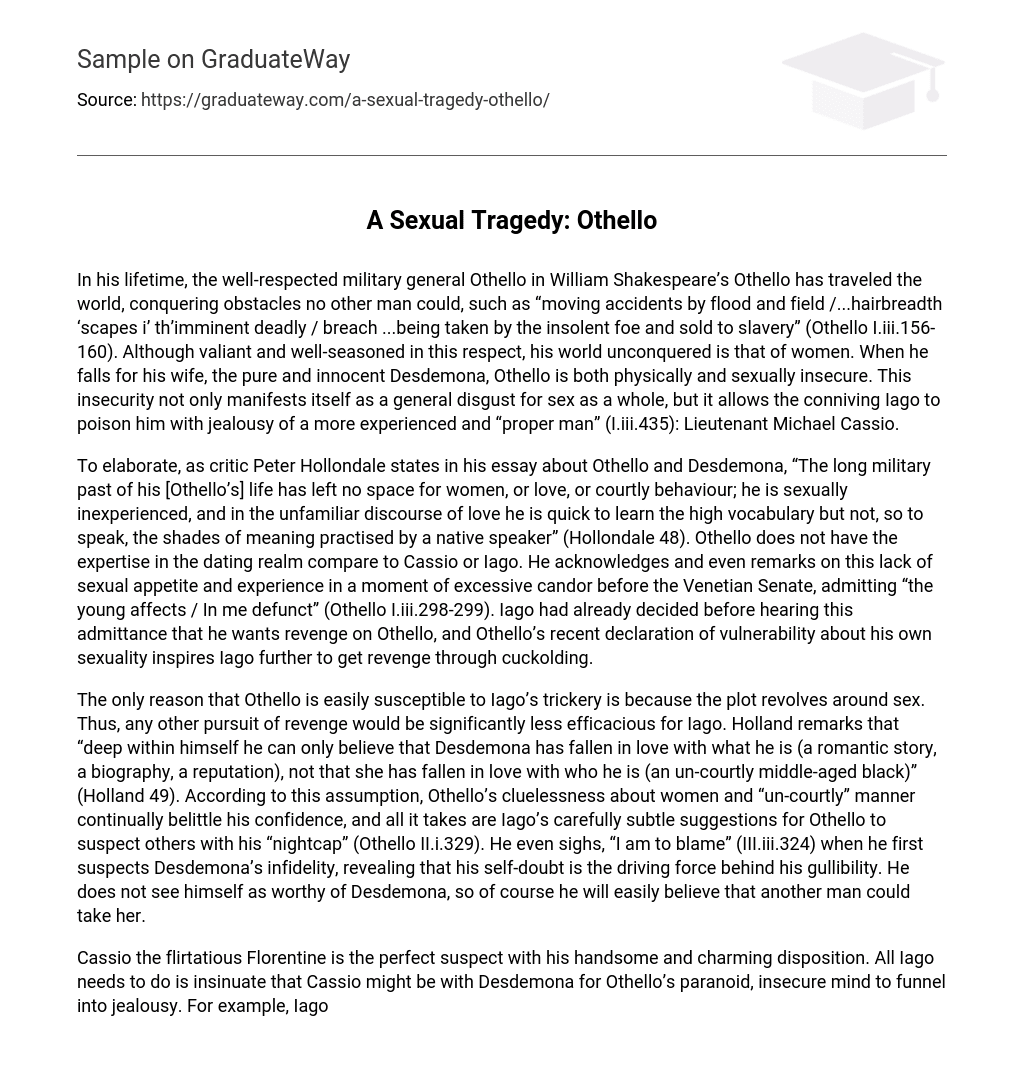In his lifetime, the well-respected military general Othello in William Shakespeare’s Othello has traveled the world, conquering obstacles no other man could, such as “moving accidents by flood and field /…hairbreadth ‘scapes i’ th’imminent deadly / breach …being taken by the insolent foe and sold to slavery” (Othello I.iii.156-160). Although valiant and well-seasoned in this respect, his world unconquered is that of women. When he falls for his wife, the pure and innocent Desdemona, Othello is both physically and sexually insecure. This insecurity not only manifests itself as a general disgust for sex as a whole, but it allows the conniving Iago to poison him with jealousy of a more experienced and “proper man” (I.iii.435): Lieutenant Michael Cassio.
To elaborate, as critic Peter Hollondale states in his essay about Othello and Desdemona, “The long military past of his [Othello’s] life has left no space for women, or love, or courtly behaviour; he is sexually inexperienced, and in the unfamiliar discourse of love he is quick to learn the high vocabulary but not, so to speak, the shades of meaning practised by a native speaker” (Hollondale 48). Othello does not have the expertise in the dating realm compare to Cassio or Iago. He acknowledges and even remarks on this lack of sexual appetite and experience in a moment of excessive candor before the Venetian Senate, admitting “the young affects / In me defunct” (Othello I.iii.298-299). Iago had already decided before hearing this admittance that he wants revenge on Othello, and Othello’s recent declaration of vulnerability about his own sexuality inspires Iago further to get revenge through cuckolding.
The only reason that Othello is easily susceptible to Iago’s trickery is because the plot revolves around sex. Thus, any other pursuit of revenge would be significantly less efficacious for Iago. Holland remarks that “deep within himself he can only believe that Desdemona has fallen in love with what he is (a romantic story, a biography, a reputation), not that she has fallen in love with who he is (an un-courtly middle-aged black)” (Holland 49). According to this assumption, Othello’s cluelessness about women and “un-courtly” manner continually belittle his confidence, and all it takes are Iago’s carefully subtle suggestions for Othello to suspect others with his “nightcap” (Othello II.i.329). He even sighs, “I am to blame” (III.iii.324) when he first suspects Desdemona’s infidelity, revealing that his self-doubt is the driving force behind his gullibility. He does not see himself as worthy of Desdemona, so of course he will easily believe that another man could take her.
Cassio the flirtatious Florentine is the perfect suspect with his handsome and charming disposition. All Iago needs to do is insinuate that Cassio might be with Desdemona for Othello’s paranoid, insecure mind to funnel into jealousy. For example, Iago needs only five words, “Ha, I like not that” (Othello III.iii.37) to begin Othello’s spiral. Because he is already predispositioned to suspiscion, his descent is steep and unrelenting, going from “My life upon her [Desdemona’s] faith” ( I.iii.335), to the oxymoronic and conflicted “Excellent wretch” (III.iii.100), and finally to “strumpet” (V.ii.99) before he strangles her in their bed.
The act of strangling itself is of important notice, but first we must digress. Within the rhetoric of Othello, there is a generally negative connotation around sex. Critic Edward Snow in his elaborately unique critique about sexual anxiety and men in Othello agrees, “Time and again in Othello language condemning adultery both masks and draws authority from an underlying guilt and disgust about sexuality itself” (Snow 388). What separates Othello from the other men is that his “underlying guilt” about sex transcends even into marital sex. He has taken his sexual insecurity and his comparison to Cassio and displaces it into a disgust for sex altogether. Some critics such as Holland have even suggested Othello has an “asexual identity” (Holland 48). Displacement is a classic defense mechanism in which a person feels threatened by their own feelings and thus transfers their anger, guilt, or insecurity in this case to another element. He takes what his insecurity about his own relationships with women, and displaces them to a general hatred of sex, even calling it “the act of shame” (Othello V.ii.251). In agreeance with Snow, this shame encompasses Desdemona’s alleged adultery on the surface, but further beneath it refers to sex itself.
Another example in this same act is Othello’s conscious statement that he can never bring Desdemona back once he kills her, “When I have pluck’d the / rose, / I cannot give it vital growth again” (V.ii.13-15). While this may be the thought he reveals to himself, one could also argue that he is subconsciously referencing Desdemona’s virginity, displacing his own internal struggle with that of frustration over Desdemona losing her so-called purity. In fact, Snow argued something similar, stating “the act of deflowering Desdemona, and a baffled attempt to undo it, are beneath Othello’s meditation on the irreversibility of ‘killing’ her” (Snow 393). He is so disgusted with sex from his psychological displacement of insecurity that he is willing to kill his wife, whom he loves, because of it.
This brings us back to the strangling itself.





